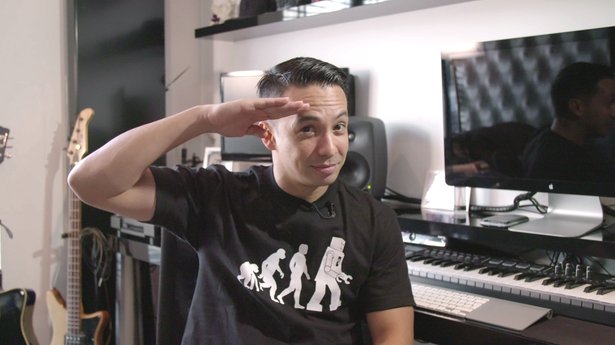How many times have you listened to an immaculately produced track and wondered how they did it? Perfect mixdowns can seem mysterious and unattainable, especially when you’re using the same production tools as a top-flight producer, but your results don’t sound that way. Perhaps a look under the hood of a big artist’s Live Set would shed some light on the techniques that separate stadium bangers from a humble demo.
Lucky for us, Dutch EDM veteran Laidback Luke has obliged our curiosity. You can download and examine the Live Set for his production “Stepping To The Beat” via the creative sharing platform Splice and see how it’s all done. You’ll need to sign up for a free account and download the Splice app to get at Luke’s Live Set, and try out his techniques for yourself.
We took the opportunity to chat to Luke about the Live Set, the perils of mixing in stereo, the importance of layering, and mixing down for club systems.
Download Laidback Luke’s Live set via Splice.
“Stepping To The Beat” by Laidback Luke
There is a whole lot of layering in this track. Are you spending much time working the EQs and envelopes to get these elements to sit together? Do you have any go-to methods for achieving balanced layering?
The key to proper layering is to find the gaps in the frequencies and then fill them up with sounds that specifically stand out in those frequencies. It can be as simple as saying, “Oh, my lead sounds a bit thin right now,” and then looking for an additional sound that has a lot going on in the 300-Hz range. If it were only those two sounds, I'd EQ out some 3 kHz in the 300-Hz-type sound. And in my thin lead, I'd make sure there were no 300 Hz sounds. This way, the two would fit together like the pieces of a puzzle. Group them in one channel, put a little bit of compression in there as glue, and they'll operate as one unit.
You’ve mentioned the importance of testing out your sub levels on club systems. Do you have any advice for those who don't have access to big stacks on a regular basis? Cheaper monitors with ported bass cavities can confuse your perception of the low end, so perhaps a good pair of headphones are more appropriate.
I produce everything on my SOL Republic Calvin Harris XC headphones. Even in the studio! So yes, I'm very much a headphones type of producer. You know what? Over almost two decades of producing music, I've developed such sensitive ears that I can't deal with the “sweet spot” in a studio environment. To me, having a sweet spot in a room means that if I move my head, the sound will change. My whole mix will sound different all of a sudden! I can't deal with that anymore. This gets eliminated by using headphones. Afterwards it's good to check on any system you can. On your laptop speakers, in your car, on your phone.
"S.A.X" by Laidback Luke & Tujamo
One main thing I do on my headphones in order not to lose track of excessive frequencies is to constantly A/B test my production with professional tracks that I know sound good everywhere. Those tracks are the law, your maps, your guidelines to a great sound.
So how they sound on your headphones is how your track should sound on headphones as well. On headphones, mixing in mono is key though! I always say: “Mono is the truth.”
The stereo image of a track can easily fool your ears. So basically I put everything in stereo at the very end of finishing off a track.
How do you keep in touch with the energy levels required in the club when you're sitting in your studio? For some it's easy to lose perspective when you're on your own trying to imagine what's going to work for a crowd.
Absolutely, so that's why I can't stress enough that you need to keep comparing your work to tracks that you know sound good in a club. That's your guideline. If your tracks sound more subby, more mid-rangey or more intense than those guide tracks, you'll know you'll have some very wrong and harmful frequencies when you’re playing in the club.
Keep up with Laidback Luke on his website and Soundcloud
